Music Therapy and Alzheimer's Disease: A Review
VerifiedAdded on 2023/06/09
|10
|2263
|154
AI Summary
This article reviews the effectiveness of music therapy in improving cognitive, psychological, and behavioral alterations in elderly patients with Alzheimer's disease. The article also discusses the potential of music therapy as a non-pharmacological treatment option for dementia patients.
Contribute Materials
Your contribution can guide someone’s learning journey. Share your
documents today.
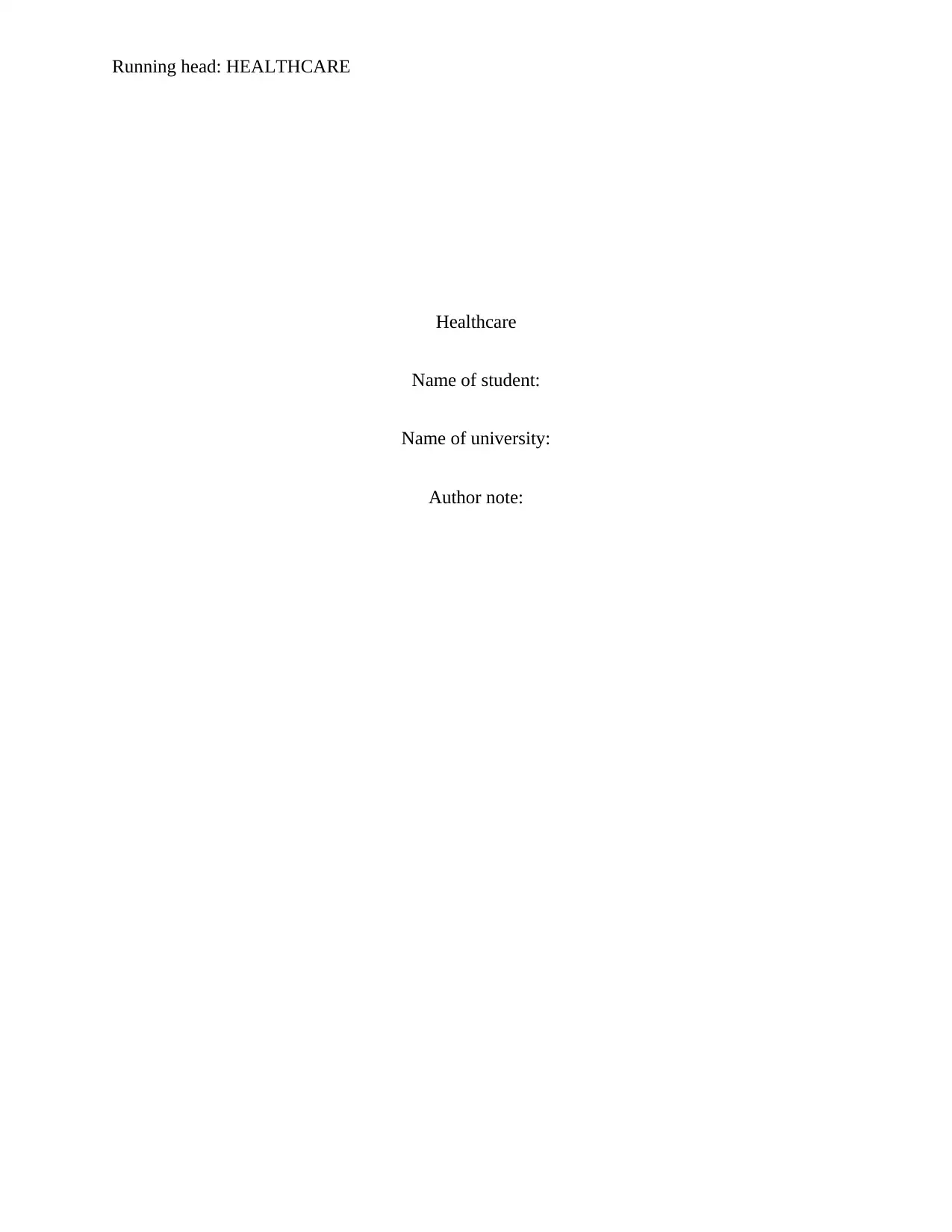
Running head: HEALTHCARE
Healthcare
Name of student:
Name of university:
Author note:
Healthcare
Name of student:
Name of university:
Author note:
Secure Best Marks with AI Grader
Need help grading? Try our AI Grader for instant feedback on your assignments.
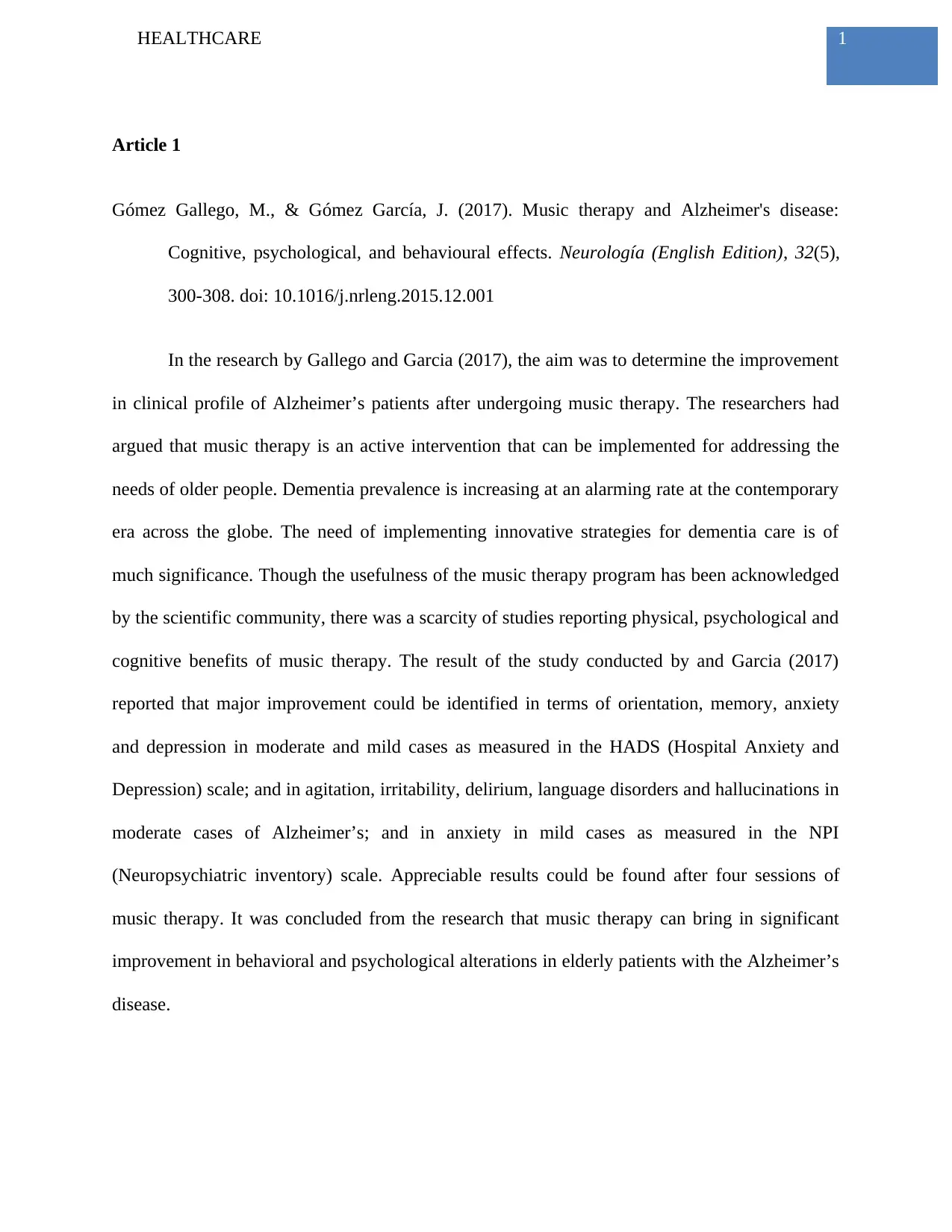
1HEALTHCARE
Article 1
Gómez Gallego, M., & Gómez García, J. (2017). Music therapy and Alzheimer's disease:
Cognitive, psychological, and behavioural effects. Neurología (English Edition), 32(5),
300-308. doi: 10.1016/j.nrleng.2015.12.001
In the research by Gallego and Garcia (2017), the aim was to determine the improvement
in clinical profile of Alzheimer’s patients after undergoing music therapy. The researchers had
argued that music therapy is an active intervention that can be implemented for addressing the
needs of older people. Dementia prevalence is increasing at an alarming rate at the contemporary
era across the globe. The need of implementing innovative strategies for dementia care is of
much significance. Though the usefulness of the music therapy program has been acknowledged
by the scientific community, there was a scarcity of studies reporting physical, psychological and
cognitive benefits of music therapy. The result of the study conducted by and Garcia (2017)
reported that major improvement could be identified in terms of orientation, memory, anxiety
and depression in moderate and mild cases as measured in the HADS (Hospital Anxiety and
Depression) scale; and in agitation, irritability, delirium, language disorders and hallucinations in
moderate cases of Alzheimer’s; and in anxiety in mild cases as measured in the NPI
(Neuropsychiatric inventory) scale. Appreciable results could be found after four sessions of
music therapy. It was concluded from the research that music therapy can bring in significant
improvement in behavioral and psychological alterations in elderly patients with the Alzheimer’s
disease.
Article 1
Gómez Gallego, M., & Gómez García, J. (2017). Music therapy and Alzheimer's disease:
Cognitive, psychological, and behavioural effects. Neurología (English Edition), 32(5),
300-308. doi: 10.1016/j.nrleng.2015.12.001
In the research by Gallego and Garcia (2017), the aim was to determine the improvement
in clinical profile of Alzheimer’s patients after undergoing music therapy. The researchers had
argued that music therapy is an active intervention that can be implemented for addressing the
needs of older people. Dementia prevalence is increasing at an alarming rate at the contemporary
era across the globe. The need of implementing innovative strategies for dementia care is of
much significance. Though the usefulness of the music therapy program has been acknowledged
by the scientific community, there was a scarcity of studies reporting physical, psychological and
cognitive benefits of music therapy. The result of the study conducted by and Garcia (2017)
reported that major improvement could be identified in terms of orientation, memory, anxiety
and depression in moderate and mild cases as measured in the HADS (Hospital Anxiety and
Depression) scale; and in agitation, irritability, delirium, language disorders and hallucinations in
moderate cases of Alzheimer’s; and in anxiety in mild cases as measured in the NPI
(Neuropsychiatric inventory) scale. Appreciable results could be found after four sessions of
music therapy. It was concluded from the research that music therapy can bring in significant
improvement in behavioral and psychological alterations in elderly patients with the Alzheimer’s
disease.
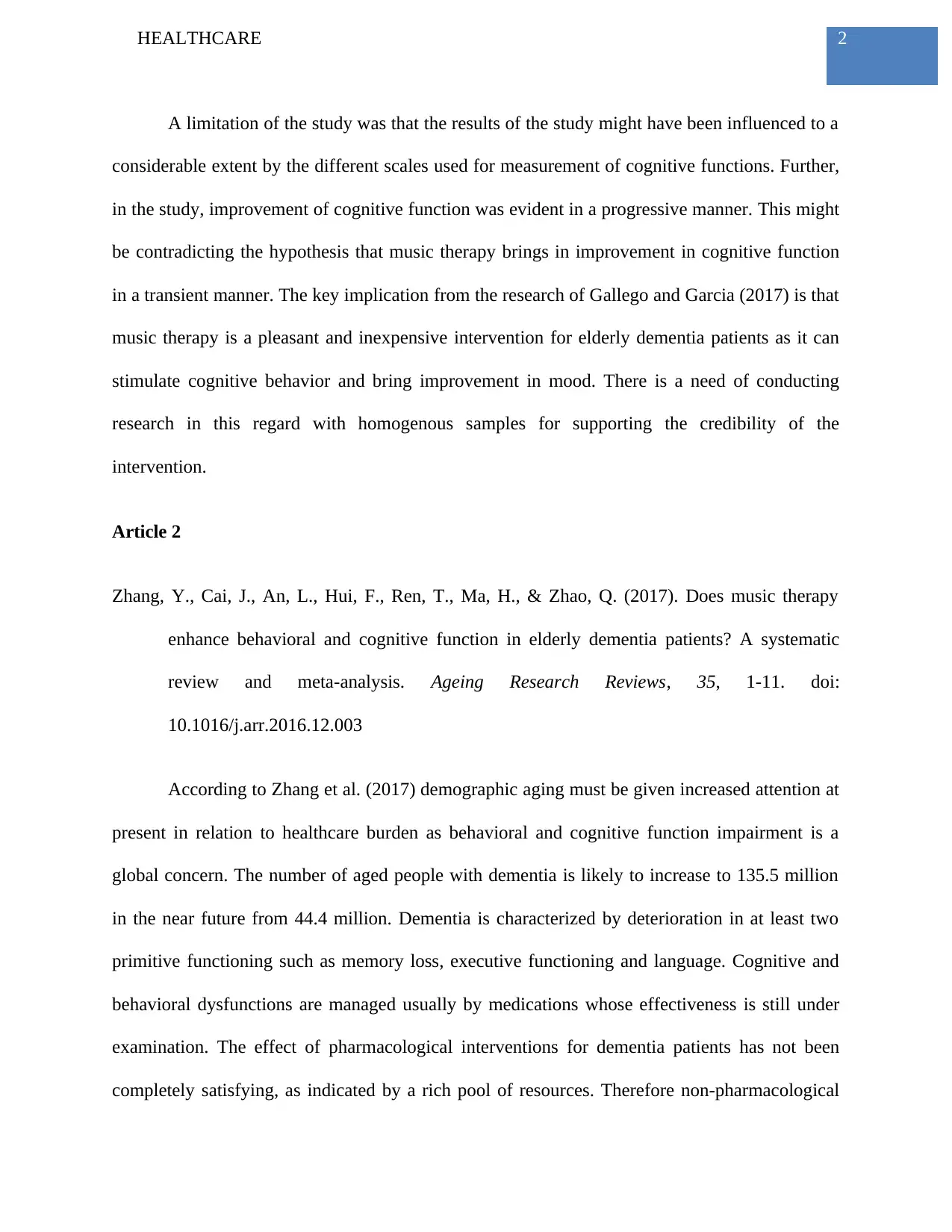
2HEALTHCARE
A limitation of the study was that the results of the study might have been influenced to a
considerable extent by the different scales used for measurement of cognitive functions. Further,
in the study, improvement of cognitive function was evident in a progressive manner. This might
be contradicting the hypothesis that music therapy brings in improvement in cognitive function
in a transient manner. The key implication from the research of Gallego and Garcia (2017) is that
music therapy is a pleasant and inexpensive intervention for elderly dementia patients as it can
stimulate cognitive behavior and bring improvement in mood. There is a need of conducting
research in this regard with homogenous samples for supporting the credibility of the
intervention.
Article 2
Zhang, Y., Cai, J., An, L., Hui, F., Ren, T., Ma, H., & Zhao, Q. (2017). Does music therapy
enhance behavioral and cognitive function in elderly dementia patients? A systematic
review and meta-analysis. Ageing Research Reviews, 35, 1-11. doi:
10.1016/j.arr.2016.12.003
According to Zhang et al. (2017) demographic aging must be given increased attention at
present in relation to healthcare burden as behavioral and cognitive function impairment is a
global concern. The number of aged people with dementia is likely to increase to 135.5 million
in the near future from 44.4 million. Dementia is characterized by deterioration in at least two
primitive functioning such as memory loss, executive functioning and language. Cognitive and
behavioral dysfunctions are managed usually by medications whose effectiveness is still under
examination. The effect of pharmacological interventions for dementia patients has not been
completely satisfying, as indicated by a rich pool of resources. Therefore non-pharmacological
A limitation of the study was that the results of the study might have been influenced to a
considerable extent by the different scales used for measurement of cognitive functions. Further,
in the study, improvement of cognitive function was evident in a progressive manner. This might
be contradicting the hypothesis that music therapy brings in improvement in cognitive function
in a transient manner. The key implication from the research of Gallego and Garcia (2017) is that
music therapy is a pleasant and inexpensive intervention for elderly dementia patients as it can
stimulate cognitive behavior and bring improvement in mood. There is a need of conducting
research in this regard with homogenous samples for supporting the credibility of the
intervention.
Article 2
Zhang, Y., Cai, J., An, L., Hui, F., Ren, T., Ma, H., & Zhao, Q. (2017). Does music therapy
enhance behavioral and cognitive function in elderly dementia patients? A systematic
review and meta-analysis. Ageing Research Reviews, 35, 1-11. doi:
10.1016/j.arr.2016.12.003
According to Zhang et al. (2017) demographic aging must be given increased attention at
present in relation to healthcare burden as behavioral and cognitive function impairment is a
global concern. The number of aged people with dementia is likely to increase to 135.5 million
in the near future from 44.4 million. Dementia is characterized by deterioration in at least two
primitive functioning such as memory loss, executive functioning and language. Cognitive and
behavioral dysfunctions are managed usually by medications whose effectiveness is still under
examination. The effect of pharmacological interventions for dementia patients has not been
completely satisfying, as indicated by a rich pool of resources. Therefore non-pharmacological
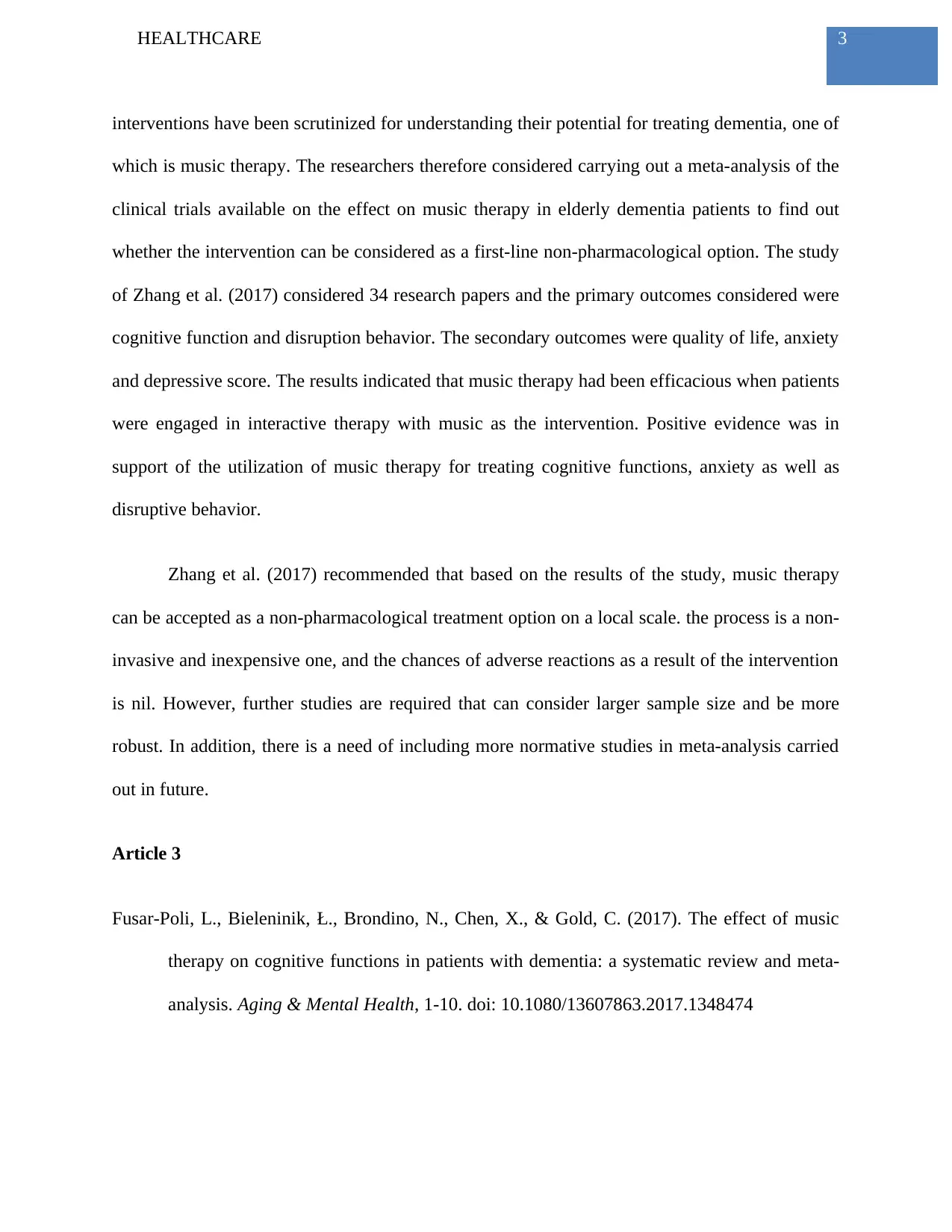
3HEALTHCARE
interventions have been scrutinized for understanding their potential for treating dementia, one of
which is music therapy. The researchers therefore considered carrying out a meta-analysis of the
clinical trials available on the effect on music therapy in elderly dementia patients to find out
whether the intervention can be considered as a first-line non-pharmacological option. The study
of Zhang et al. (2017) considered 34 research papers and the primary outcomes considered were
cognitive function and disruption behavior. The secondary outcomes were quality of life, anxiety
and depressive score. The results indicated that music therapy had been efficacious when patients
were engaged in interactive therapy with music as the intervention. Positive evidence was in
support of the utilization of music therapy for treating cognitive functions, anxiety as well as
disruptive behavior.
Zhang et al. (2017) recommended that based on the results of the study, music therapy
can be accepted as a non-pharmacological treatment option on a local scale. the process is a non-
invasive and inexpensive one, and the chances of adverse reactions as a result of the intervention
is nil. However, further studies are required that can consider larger sample size and be more
robust. In addition, there is a need of including more normative studies in meta-analysis carried
out in future.
Article 3
Fusar-Poli, L., Bieleninik, Ł., Brondino, N., Chen, X., & Gold, C. (2017). The effect of music
therapy on cognitive functions in patients with dementia: a systematic review and meta-
analysis. Aging & Mental Health, 1-10. doi: 10.1080/13607863.2017.1348474
interventions have been scrutinized for understanding their potential for treating dementia, one of
which is music therapy. The researchers therefore considered carrying out a meta-analysis of the
clinical trials available on the effect on music therapy in elderly dementia patients to find out
whether the intervention can be considered as a first-line non-pharmacological option. The study
of Zhang et al. (2017) considered 34 research papers and the primary outcomes considered were
cognitive function and disruption behavior. The secondary outcomes were quality of life, anxiety
and depressive score. The results indicated that music therapy had been efficacious when patients
were engaged in interactive therapy with music as the intervention. Positive evidence was in
support of the utilization of music therapy for treating cognitive functions, anxiety as well as
disruptive behavior.
Zhang et al. (2017) recommended that based on the results of the study, music therapy
can be accepted as a non-pharmacological treatment option on a local scale. the process is a non-
invasive and inexpensive one, and the chances of adverse reactions as a result of the intervention
is nil. However, further studies are required that can consider larger sample size and be more
robust. In addition, there is a need of including more normative studies in meta-analysis carried
out in future.
Article 3
Fusar-Poli, L., Bieleninik, Ł., Brondino, N., Chen, X., & Gold, C. (2017). The effect of music
therapy on cognitive functions in patients with dementia: a systematic review and meta-
analysis. Aging & Mental Health, 1-10. doi: 10.1080/13607863.2017.1348474
Secure Best Marks with AI Grader
Need help grading? Try our AI Grader for instant feedback on your assignments.
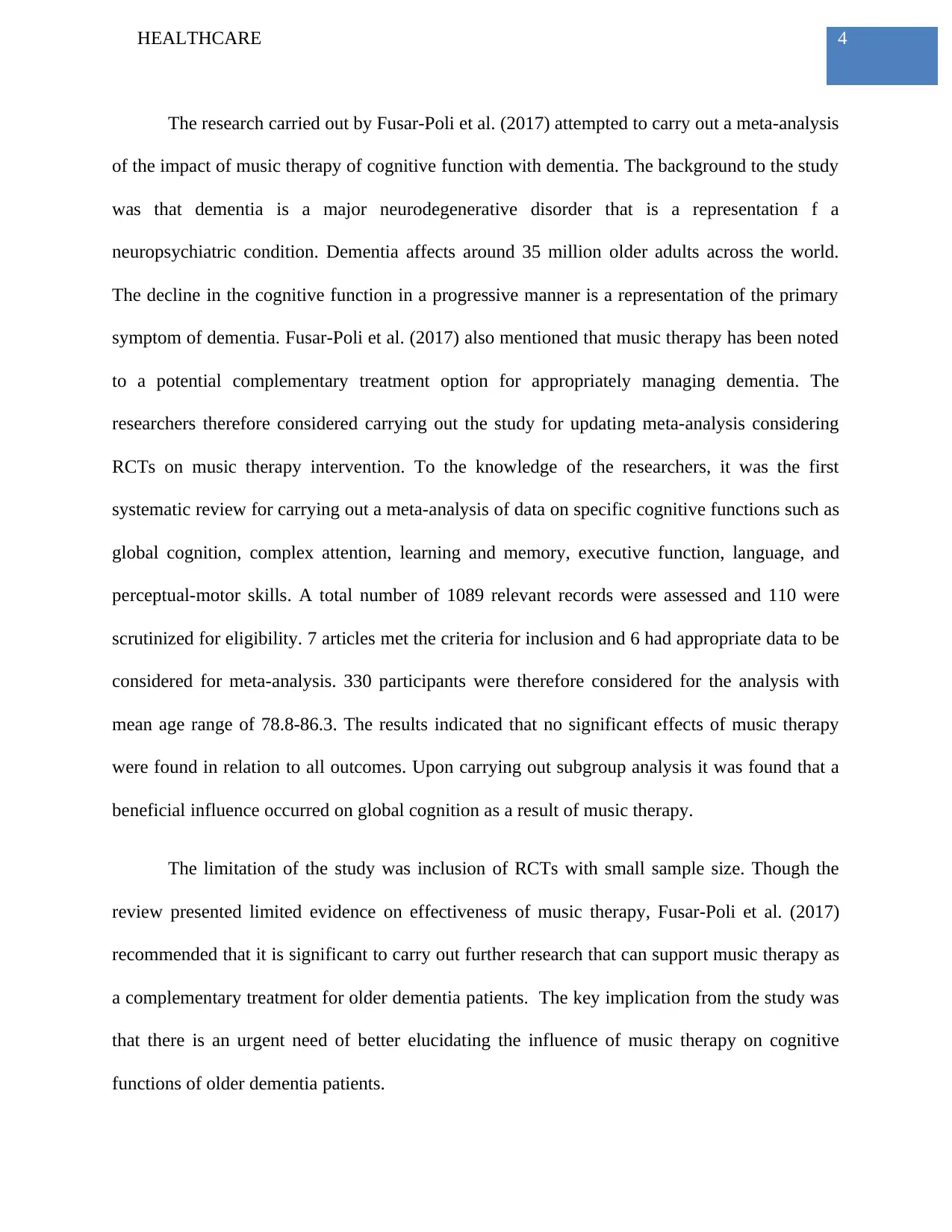
4HEALTHCARE
The research carried out by Fusar-Poli et al. (2017) attempted to carry out a meta-analysis
of the impact of music therapy of cognitive function with dementia. The background to the study
was that dementia is a major neurodegenerative disorder that is a representation f a
neuropsychiatric condition. Dementia affects around 35 million older adults across the world.
The decline in the cognitive function in a progressive manner is a representation of the primary
symptom of dementia. Fusar-Poli et al. (2017) also mentioned that music therapy has been noted
to a potential complementary treatment option for appropriately managing dementia. The
researchers therefore considered carrying out the study for updating meta-analysis considering
RCTs on music therapy intervention. To the knowledge of the researchers, it was the first
systematic review for carrying out a meta-analysis of data on specific cognitive functions such as
global cognition, complex attention, learning and memory, executive function, language, and
perceptual-motor skills. A total number of 1089 relevant records were assessed and 110 were
scrutinized for eligibility. 7 articles met the criteria for inclusion and 6 had appropriate data to be
considered for meta-analysis. 330 participants were therefore considered for the analysis with
mean age range of 78.8-86.3. The results indicated that no significant effects of music therapy
were found in relation to all outcomes. Upon carrying out subgroup analysis it was found that a
beneficial influence occurred on global cognition as a result of music therapy.
The limitation of the study was inclusion of RCTs with small sample size. Though the
review presented limited evidence on effectiveness of music therapy, Fusar-Poli et al. (2017)
recommended that it is significant to carry out further research that can support music therapy as
a complementary treatment for older dementia patients. The key implication from the study was
that there is an urgent need of better elucidating the influence of music therapy on cognitive
functions of older dementia patients.
The research carried out by Fusar-Poli et al. (2017) attempted to carry out a meta-analysis
of the impact of music therapy of cognitive function with dementia. The background to the study
was that dementia is a major neurodegenerative disorder that is a representation f a
neuropsychiatric condition. Dementia affects around 35 million older adults across the world.
The decline in the cognitive function in a progressive manner is a representation of the primary
symptom of dementia. Fusar-Poli et al. (2017) also mentioned that music therapy has been noted
to a potential complementary treatment option for appropriately managing dementia. The
researchers therefore considered carrying out the study for updating meta-analysis considering
RCTs on music therapy intervention. To the knowledge of the researchers, it was the first
systematic review for carrying out a meta-analysis of data on specific cognitive functions such as
global cognition, complex attention, learning and memory, executive function, language, and
perceptual-motor skills. A total number of 1089 relevant records were assessed and 110 were
scrutinized for eligibility. 7 articles met the criteria for inclusion and 6 had appropriate data to be
considered for meta-analysis. 330 participants were therefore considered for the analysis with
mean age range of 78.8-86.3. The results indicated that no significant effects of music therapy
were found in relation to all outcomes. Upon carrying out subgroup analysis it was found that a
beneficial influence occurred on global cognition as a result of music therapy.
The limitation of the study was inclusion of RCTs with small sample size. Though the
review presented limited evidence on effectiveness of music therapy, Fusar-Poli et al. (2017)
recommended that it is significant to carry out further research that can support music therapy as
a complementary treatment for older dementia patients. The key implication from the study was
that there is an urgent need of better elucidating the influence of music therapy on cognitive
functions of older dementia patients.

5HEALTHCARE
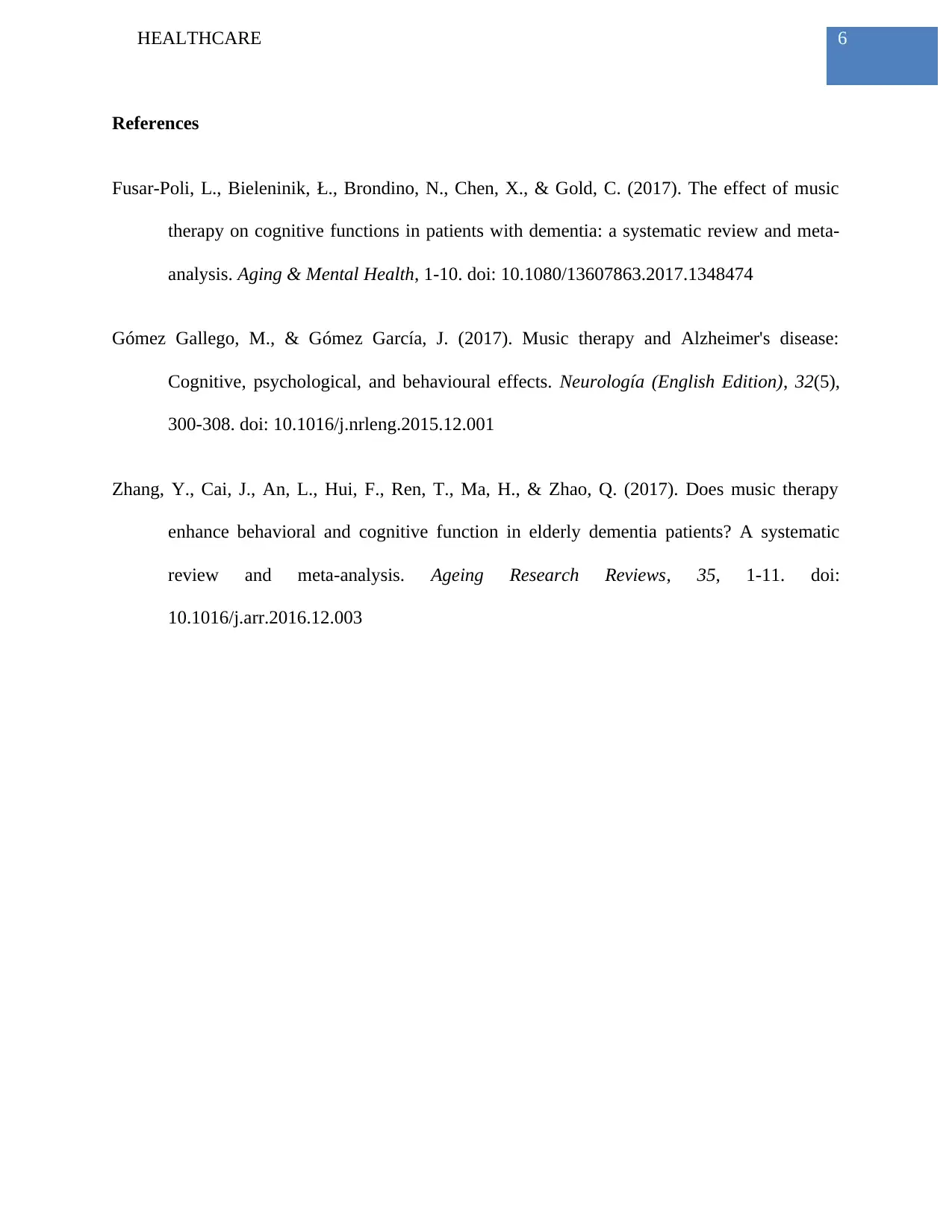
6HEALTHCARE
References
Fusar-Poli, L., Bieleninik, Ł., Brondino, N., Chen, X., & Gold, C. (2017). The effect of music
therapy on cognitive functions in patients with dementia: a systematic review and meta-
analysis. Aging & Mental Health, 1-10. doi: 10.1080/13607863.2017.1348474
Gómez Gallego, M., & Gómez García, J. (2017). Music therapy and Alzheimer's disease:
Cognitive, psychological, and behavioural effects. Neurología (English Edition), 32(5),
300-308. doi: 10.1016/j.nrleng.2015.12.001
Zhang, Y., Cai, J., An, L., Hui, F., Ren, T., Ma, H., & Zhao, Q. (2017). Does music therapy
enhance behavioral and cognitive function in elderly dementia patients? A systematic
review and meta-analysis. Ageing Research Reviews, 35, 1-11. doi:
10.1016/j.arr.2016.12.003
References
Fusar-Poli, L., Bieleninik, Ł., Brondino, N., Chen, X., & Gold, C. (2017). The effect of music
therapy on cognitive functions in patients with dementia: a systematic review and meta-
analysis. Aging & Mental Health, 1-10. doi: 10.1080/13607863.2017.1348474
Gómez Gallego, M., & Gómez García, J. (2017). Music therapy and Alzheimer's disease:
Cognitive, psychological, and behavioural effects. Neurología (English Edition), 32(5),
300-308. doi: 10.1016/j.nrleng.2015.12.001
Zhang, Y., Cai, J., An, L., Hui, F., Ren, T., Ma, H., & Zhao, Q. (2017). Does music therapy
enhance behavioral and cognitive function in elderly dementia patients? A systematic
review and meta-analysis. Ageing Research Reviews, 35, 1-11. doi:
10.1016/j.arr.2016.12.003
Paraphrase This Document
Need a fresh take? Get an instant paraphrase of this document with our AI Paraphraser
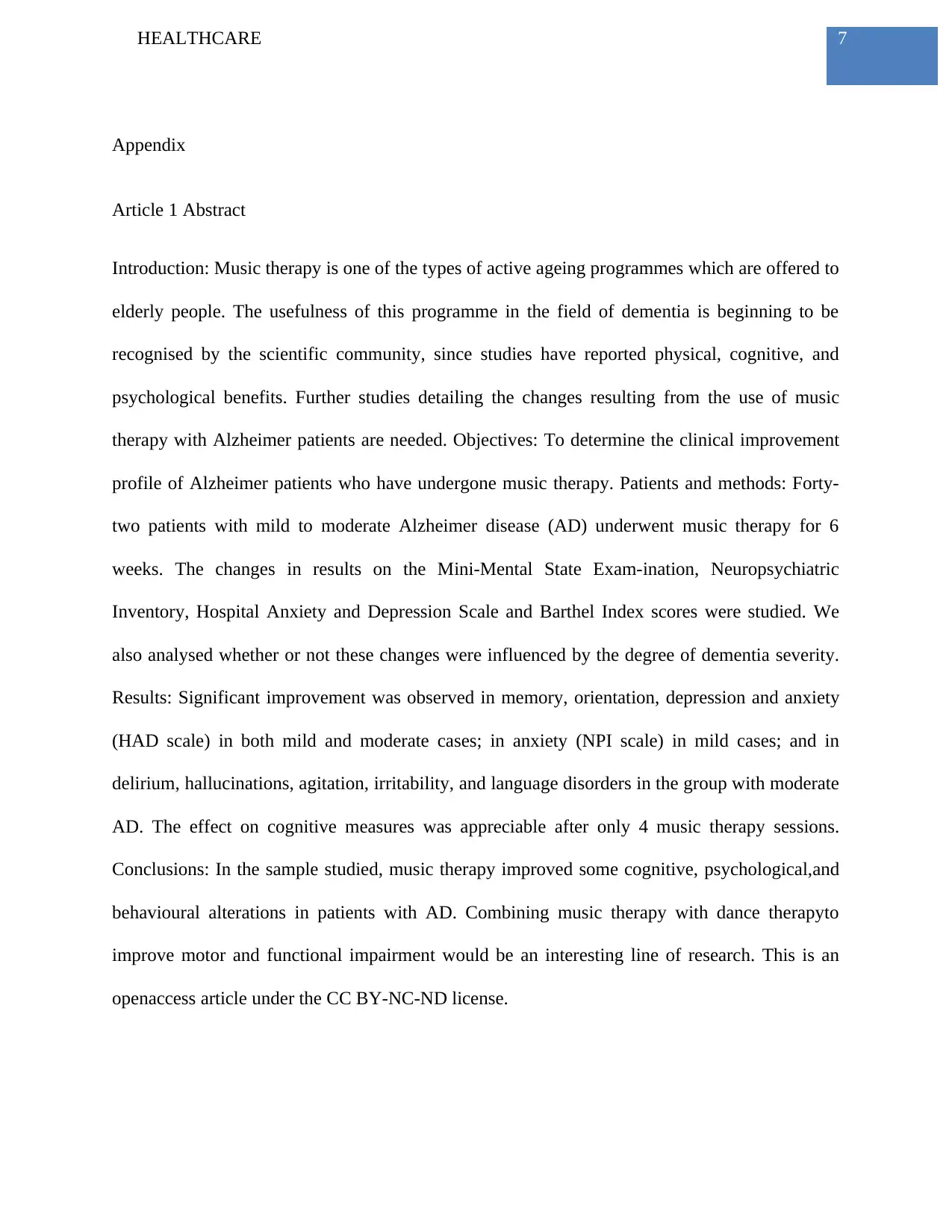
7HEALTHCARE
Appendix
Article 1 Abstract
Introduction: Music therapy is one of the types of active ageing programmes which are offered to
elderly people. The usefulness of this programme in the field of dementia is beginning to be
recognised by the scientific community, since studies have reported physical, cognitive, and
psychological benefits. Further studies detailing the changes resulting from the use of music
therapy with Alzheimer patients are needed. Objectives: To determine the clinical improvement
profile of Alzheimer patients who have undergone music therapy. Patients and methods: Forty-
two patients with mild to moderate Alzheimer disease (AD) underwent music therapy for 6
weeks. The changes in results on the Mini-Mental State Exam-ination, Neuropsychiatric
Inventory, Hospital Anxiety and Depression Scale and Barthel Index scores were studied. We
also analysed whether or not these changes were influenced by the degree of dementia severity.
Results: Significant improvement was observed in memory, orientation, depression and anxiety
(HAD scale) in both mild and moderate cases; in anxiety (NPI scale) in mild cases; and in
delirium, hallucinations, agitation, irritability, and language disorders in the group with moderate
AD. The effect on cognitive measures was appreciable after only 4 music therapy sessions.
Conclusions: In the sample studied, music therapy improved some cognitive, psychological,and
behavioural alterations in patients with AD. Combining music therapy with dance therapyto
improve motor and functional impairment would be an interesting line of research. This is an
openaccess article under the CC BY-NC-ND license.
Appendix
Article 1 Abstract
Introduction: Music therapy is one of the types of active ageing programmes which are offered to
elderly people. The usefulness of this programme in the field of dementia is beginning to be
recognised by the scientific community, since studies have reported physical, cognitive, and
psychological benefits. Further studies detailing the changes resulting from the use of music
therapy with Alzheimer patients are needed. Objectives: To determine the clinical improvement
profile of Alzheimer patients who have undergone music therapy. Patients and methods: Forty-
two patients with mild to moderate Alzheimer disease (AD) underwent music therapy for 6
weeks. The changes in results on the Mini-Mental State Exam-ination, Neuropsychiatric
Inventory, Hospital Anxiety and Depression Scale and Barthel Index scores were studied. We
also analysed whether or not these changes were influenced by the degree of dementia severity.
Results: Significant improvement was observed in memory, orientation, depression and anxiety
(HAD scale) in both mild and moderate cases; in anxiety (NPI scale) in mild cases; and in
delirium, hallucinations, agitation, irritability, and language disorders in the group with moderate
AD. The effect on cognitive measures was appreciable after only 4 music therapy sessions.
Conclusions: In the sample studied, music therapy improved some cognitive, psychological,and
behavioural alterations in patients with AD. Combining music therapy with dance therapyto
improve motor and functional impairment would be an interesting line of research. This is an
openaccess article under the CC BY-NC-ND license.
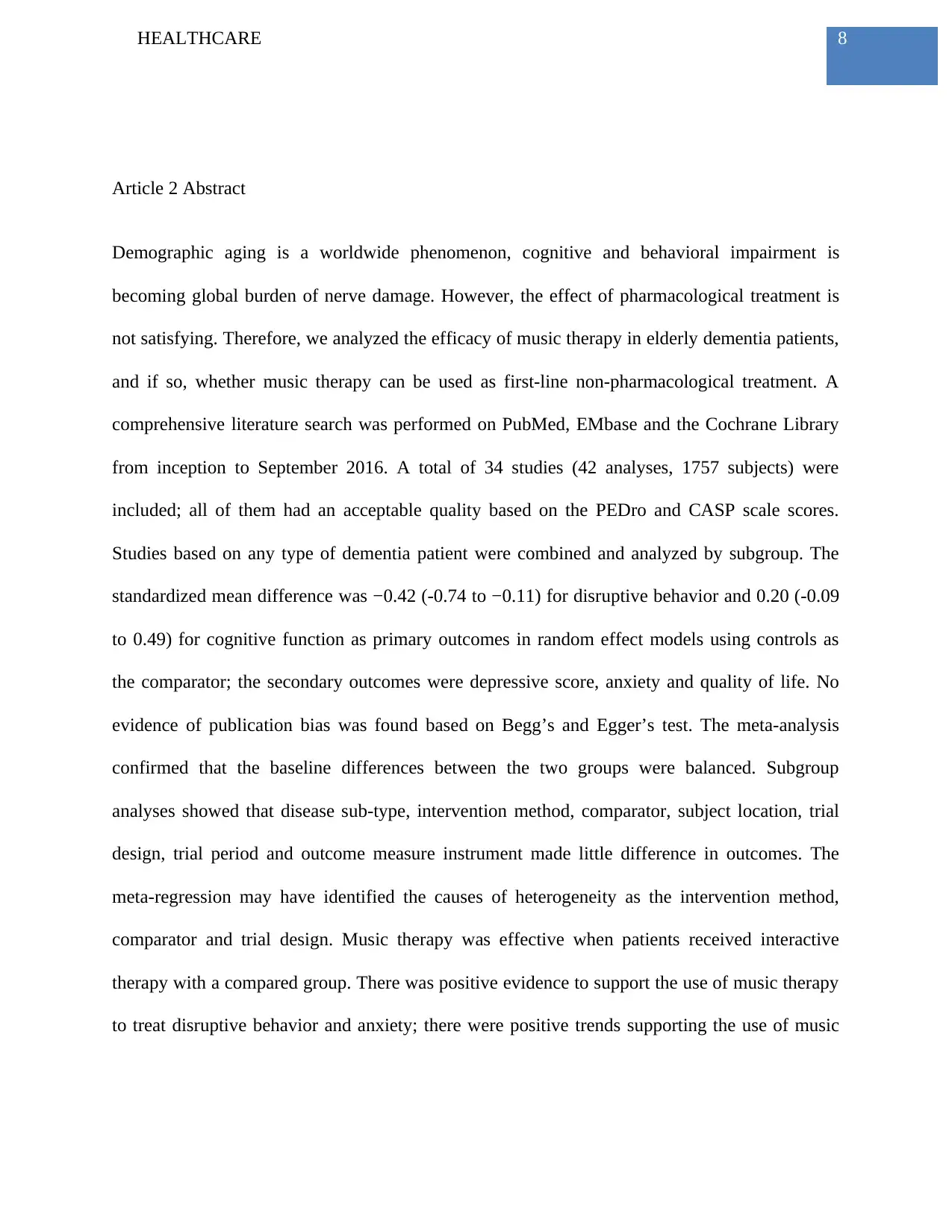
8HEALTHCARE
Article 2 Abstract
Demographic aging is a worldwide phenomenon, cognitive and behavioral impairment is
becoming global burden of nerve damage. However, the effect of pharmacological treatment is
not satisfying. Therefore, we analyzed the efficacy of music therapy in elderly dementia patients,
and if so, whether music therapy can be used as first-line non-pharmacological treatment. A
comprehensive literature search was performed on PubMed, EMbase and the Cochrane Library
from inception to September 2016. A total of 34 studies (42 analyses, 1757 subjects) were
included; all of them had an acceptable quality based on the PEDro and CASP scale scores.
Studies based on any type of dementia patient were combined and analyzed by subgroup. The
standardized mean difference was −0.42 (-0.74 to −0.11) for disruptive behavior and 0.20 (-0.09
to 0.49) for cognitive function as primary outcomes in random effect models using controls as
the comparator; the secondary outcomes were depressive score, anxiety and quality of life. No
evidence of publication bias was found based on Begg’s and Egger’s test. The meta-analysis
confirmed that the baseline differences between the two groups were balanced. Subgroup
analyses showed that disease sub-type, intervention method, comparator, subject location, trial
design, trial period and outcome measure instrument made little difference in outcomes. The
meta-regression may have identified the causes of heterogeneity as the intervention method,
comparator and trial design. Music therapy was effective when patients received interactive
therapy with a compared group. There was positive evidence to support the use of music therapy
to treat disruptive behavior and anxiety; there were positive trends supporting the use of music
Article 2 Abstract
Demographic aging is a worldwide phenomenon, cognitive and behavioral impairment is
becoming global burden of nerve damage. However, the effect of pharmacological treatment is
not satisfying. Therefore, we analyzed the efficacy of music therapy in elderly dementia patients,
and if so, whether music therapy can be used as first-line non-pharmacological treatment. A
comprehensive literature search was performed on PubMed, EMbase and the Cochrane Library
from inception to September 2016. A total of 34 studies (42 analyses, 1757 subjects) were
included; all of them had an acceptable quality based on the PEDro and CASP scale scores.
Studies based on any type of dementia patient were combined and analyzed by subgroup. The
standardized mean difference was −0.42 (-0.74 to −0.11) for disruptive behavior and 0.20 (-0.09
to 0.49) for cognitive function as primary outcomes in random effect models using controls as
the comparator; the secondary outcomes were depressive score, anxiety and quality of life. No
evidence of publication bias was found based on Begg’s and Egger’s test. The meta-analysis
confirmed that the baseline differences between the two groups were balanced. Subgroup
analyses showed that disease sub-type, intervention method, comparator, subject location, trial
design, trial period and outcome measure instrument made little difference in outcomes. The
meta-regression may have identified the causes of heterogeneity as the intervention method,
comparator and trial design. Music therapy was effective when patients received interactive
therapy with a compared group. There was positive evidence to support the use of music therapy
to treat disruptive behavior and anxiety; there were positive trends supporting the use of music
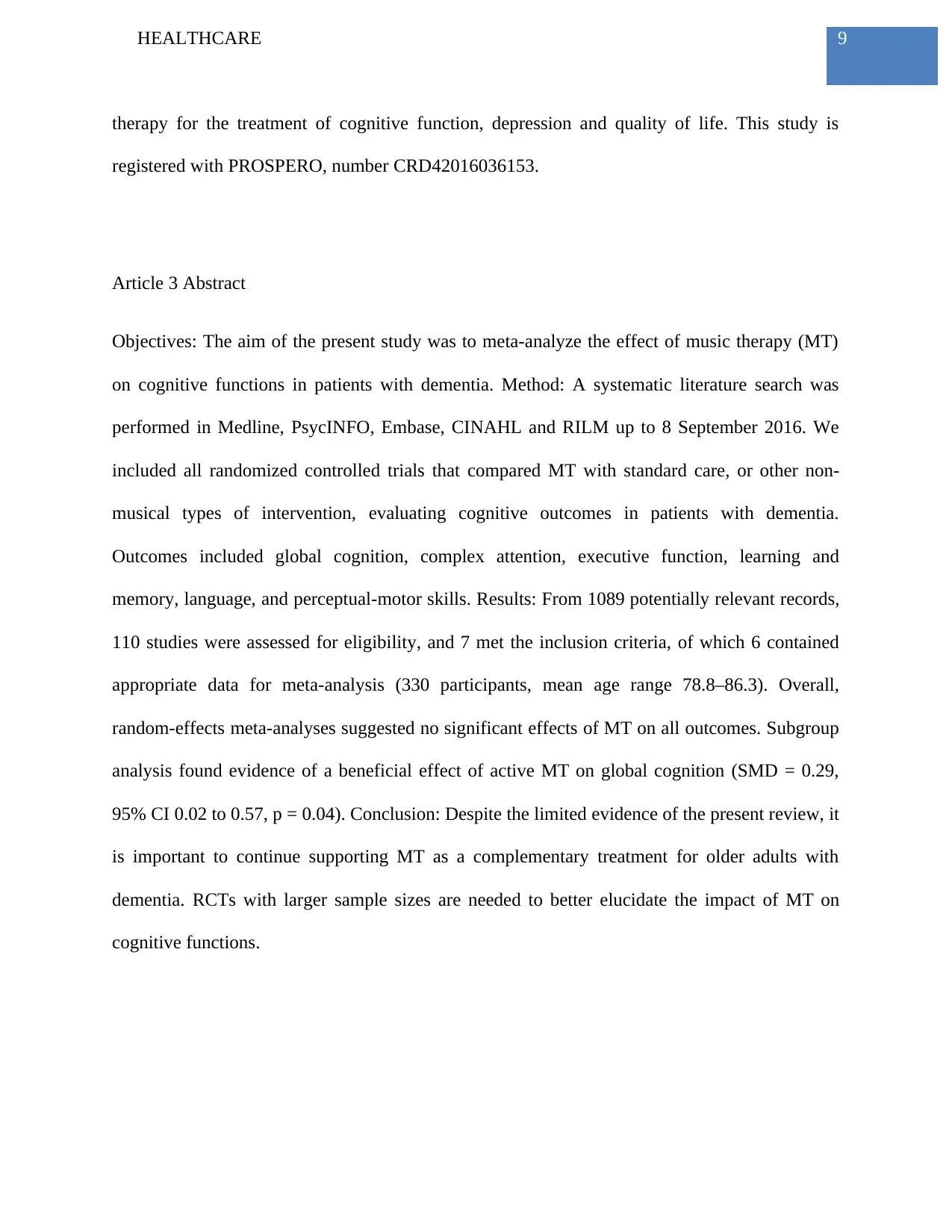
9HEALTHCARE
therapy for the treatment of cognitive function, depression and quality of life. This study is
registered with PROSPERO, number CRD42016036153.
Article 3 Abstract
Objectives: The aim of the present study was to meta-analyze the effect of music therapy (MT)
on cognitive functions in patients with dementia. Method: A systematic literature search was
performed in Medline, PsycINFO, Embase, CINAHL and RILM up to 8 September 2016. We
included all randomized controlled trials that compared MT with standard care, or other non-
musical types of intervention, evaluating cognitive outcomes in patients with dementia.
Outcomes included global cognition, complex attention, executive function, learning and
memory, language, and perceptual-motor skills. Results: From 1089 potentially relevant records,
110 studies were assessed for eligibility, and 7 met the inclusion criteria, of which 6 contained
appropriate data for meta-analysis (330 participants, mean age range 78.8–86.3). Overall,
random-effects meta-analyses suggested no significant effects of MT on all outcomes. Subgroup
analysis found evidence of a beneficial effect of active MT on global cognition (SMD = 0.29,
95% CI 0.02 to 0.57, p = 0.04). Conclusion: Despite the limited evidence of the present review, it
is important to continue supporting MT as a complementary treatment for older adults with
dementia. RCTs with larger sample sizes are needed to better elucidate the impact of MT on
cognitive functions.
therapy for the treatment of cognitive function, depression and quality of life. This study is
registered with PROSPERO, number CRD42016036153.
Article 3 Abstract
Objectives: The aim of the present study was to meta-analyze the effect of music therapy (MT)
on cognitive functions in patients with dementia. Method: A systematic literature search was
performed in Medline, PsycINFO, Embase, CINAHL and RILM up to 8 September 2016. We
included all randomized controlled trials that compared MT with standard care, or other non-
musical types of intervention, evaluating cognitive outcomes in patients with dementia.
Outcomes included global cognition, complex attention, executive function, learning and
memory, language, and perceptual-motor skills. Results: From 1089 potentially relevant records,
110 studies were assessed for eligibility, and 7 met the inclusion criteria, of which 6 contained
appropriate data for meta-analysis (330 participants, mean age range 78.8–86.3). Overall,
random-effects meta-analyses suggested no significant effects of MT on all outcomes. Subgroup
analysis found evidence of a beneficial effect of active MT on global cognition (SMD = 0.29,
95% CI 0.02 to 0.57, p = 0.04). Conclusion: Despite the limited evidence of the present review, it
is important to continue supporting MT as a complementary treatment for older adults with
dementia. RCTs with larger sample sizes are needed to better elucidate the impact of MT on
cognitive functions.
1 out of 10
Related Documents
Your All-in-One AI-Powered Toolkit for Academic Success.
+13062052269
info@desklib.com
Available 24*7 on WhatsApp / Email
![[object Object]](/_next/static/media/star-bottom.7253800d.svg)
Unlock your academic potential
© 2024 | Zucol Services PVT LTD | All rights reserved.


